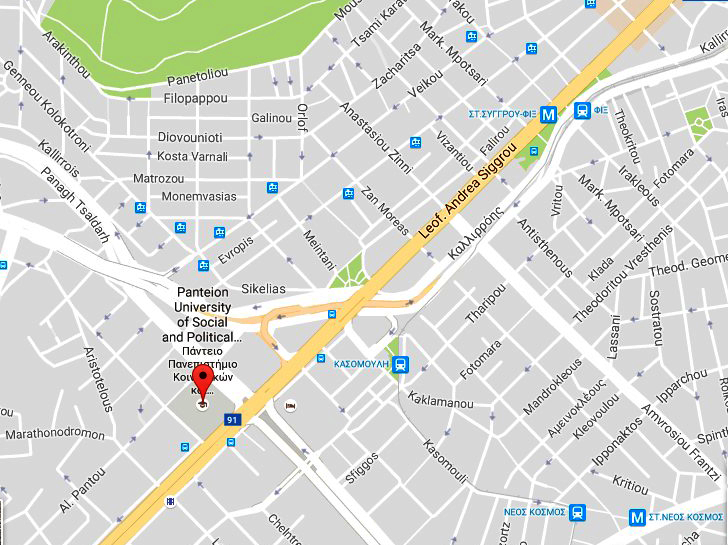Ideologies - Extremism - Identities (Research)
Extremism
The social and political psychology lab participates at the HORIZON-EUROPE funded project:
Countering Oppositional Political Extremism through Attuned Dialogue: Track, Attune, Limit (OppAttune).
Panteion University has the administrative coordination of the project and coordinates the WideLens Survey (PI Prof. Xenia Chryssochoou, Project Manager Dr Dimitrios Barkas, Post Doctoral Fellow Antonis Dimakis). The project is scientifically led by the Open University and the Glasgow Calendonian University (UK).
OppAttune tracks the evolution of oppositional extreme ideologies and protectionist decision-making, develops an innovative attunement model and tests a series of interventions at the national and transnational levels which limit the spread of extremism. It delivers this via a multidisciplinary consortium of 17 countries across the EU and its periphery. Oppositional worldviews, narratives and dissensus within public debate are all vital to a functioning democracy. However destructive polarisation of oppositional us/them logic is at the core of the rise of extremist narratives. We are studying this oppositional logic that includes disinformation, emotions, hot cognitions, conspiracy theories and mistrust to create new forms of direct action.

Conspiracy Theories
"They spray us from above... they manipulate us...".
A social psychological investigation of conspiracy theories in crisis ridden Greece.
PI: Prof Xenia Chryssochoou, PhD
Co-investigator: Alexandra Hantzi, PhD
Researchers: Artemis Griva, PhD, Antonis Dimakis, PhD Candidate
Funded by: The European Social Fund
The project studies conspiracy theories in connection with representations of social order in crisis ridden Greece, using social psychological theoretical tools and adopting different methodologies. We are looking at the content of conspiracy theories, at the ideological and identity factors connected with conspiracy beliefs as well as at the consequences of these beliefs for social action and cohesion in conditions of long-lasting crisis.
Populism
Towards a social psychological approach of populism: Testing the Populist Representations Model across four European countries
PI: Prof Christian Stearkle, University of Lausanne Switzerland
Co-investigators: Xenia Chryssochoou; Nikos Kalampalikis, University of Lyon II France; Inari Sakki, University of Eastern Finland
Researchers: Matteo Cavallaro, PhD; Anna Cortijos Bernabeu, PhD candidate; Stephane Bonny, Junior researcher
Funded by the Swiss National Science Foundation
The project offers an interdisciplinary framework to study populist representations across four European countries: Switzerland, Finland, France and Greece. It examines: the structure of populist representations underlying different types of populism; the role of psychological “self-appraisal” antecedents (relative deprivation, perceived political inefficacy, and anomy) in explaining populist support; the outcomes of populist representations in terms of attitudes towards social justice and inequality-regulating policies. Finally, it investigates the temporal development of populist representations over the last two decades in the four countries.
Populist appeal: imagery, emotions and identities
PI: Ass. Prof. Inari Sakki, PhD
Co-investigators: Xenia Chryssochoou; Nikos Kalampalikis, University of Lyon II France; Christian Staerkle, University of Lausanne Switzerland
Funded by: The Kone Foundation, Finland
Populist parties have been successful in recent years. However, so far, little is known about how populist rhetoric persuades and mobilises voters. The main goal of the project is to explore how a populist message attracts and mobilises supporters. We examine the role of representations, affects and identities in mobilising a populist communication through three perspectives: (1) citizens, (2) populist leaders and (3) populist media.
European and National Identities
Researching identification with Europe and the role of national identifications and economic asymmetries have been a long-standing research area of Xenia Chryssochoou, since her PhD on national and European identification of French and Greek people. This initial interest continued over the years and 20 years after the Maastricht Treaty of 1992 she suggests that building a European identity on common values was a frail way to support the European integration insofar the economic inequalities between member-states continued to exist (Chryssochoou, 2013). This trend was amplified with the economic crisis of 2008 onwards and is deepening with the policy divisions in relation to the corona virus emergency and the lack of solidarity between member-states. The laboratory continues to research this issue and different aspects are investigated with the collaboration with Katerina Petkanopoulou and colleagues over Europe (see also research on economic inequalities). Moreover, the PhD of Ioannis Ntotsikas on “National Identity and Social Representations: Memory, history and narratives” is looking how Greek national identity is (re)-constructed in a context of European integration, a post-democratic political social order and the emergence of nationalistic and right-wing populist parties.
The laboratory is also participating in the following project
Sharing wealth and decisions in Europe: identity and legitimacy
PI: Denis Sindic ISCTE: Instituto Universitario de Lisboa
Co-investigators: Xenia Chryssochoou, David Bourguignon (Université Catholique de Louvain) and Inga Jasinskaja-Lahti (University of Helsinki)
Funded by the Portuguese National Agency for Research
The project among other things aims to show that the impact of European identification on political attitudes towards the EU (conceived as support for more or for less European integration) is mediated by perceptions of legitimacy of wealth sharing, taking common political decisions and sharing common practices. Moreover, we look at the possible moderating role between perceived legitimacy and attitudes towards the EU of the consonance or dissonance perceived between the ideal Europe and its reality.
The following European funded programs are included in the laboratory with PI Prof. Alexandra Koronaiou
ΜYWeB (Measuring Youth Well-Being) a balanced approach to assessing the feasibility of a European Longitudinal Study for Children and Young People (ELSCYP) through prioritizing both scientific and policy imperatives, FP7 2014-2016
InnoSI (Innovative Social Investment: Strengthening communities in Europe), HORIZON 2020, (2015-2017)
CoSIE (Co-creation of service innovation in Europe), The rising rate of complexity based on increasing uncertainty and interdependencies challenge the top-down approaches associated with governmentality. CoSIE (ID: 770492). H2020-EU.3.6.2.2.
DARE Dialogue About Radicalization and Equality, ID: 725349, H2020,
1 May 2017 - 31 October 2021, DARE aims to significantly increase understanding of why and how young people become radicalized and our capacity to effectively counter radicalization.

